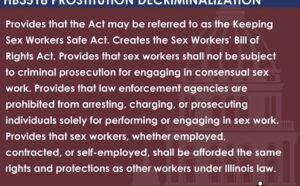Sex workers and sex worker advocates in Durban, Polokwane, Cape Town and Johannesburg took to the streets on Monday to honor International Sex Worker Rights’ Day. Similar marches were held in cities and towns all over the world. The protesters were calling attention to the human rights abuses suffered by sex workers and demanded legal recognition of sex work as a form of employment.
The third of March is an important day for sex worker rights. The Durbar Mahila Samanwaya Committee, a sex worker group in India with more than 50,000 members, organised a festival in 2001. The festival saw 250,000 sex workers and supporters gather in Calcutta, India to celebrate. This despite pressure by anti-sex worker groups who tried – unsuccessfully – to persuade the Indian government to take away its permission for the festival to take place.
In Cape Town, a group of activists gathered in District Six and marched to the offices of the Department of Justice and Constitutional Development in Plein Street. Bright orange t-shirts and placards demanded, “Decriminalise sex work” and “Justice for sex workers”.
I asked Gillian, a 47-year-old sex worker, why she was marching. “We are demanding our dignity. We want people to recognize that sex work is like any other job. We are parents. We want to take our children to school, put food on the table. We are not useless. We are human beings.” Gillian has worked in the industry for 17 years.
A group of male sex workers gathered to talk about the march. Like many of the marchers, they wore festive masks to hide their identity. They worried that police might recognise them – sex work is a criminal activity under South African law, and that is partly why they were protesting. They don’t want to be scared anymore of police abuse and arrest.

Demonstrators wearing “Decriminalise sex work” and “Justice for sex workers” t-shirts in Cape Town. Photo by Marlise Richter.
“We need people to understand our rights. We are all human beings. [Sex work] is the way we survive. We are proud of it,” they told me. They are all in their late 20s and have been working as sex workers from a few months to three years. They also spoke to me about countries that have homophobic laws and attitudes, torture and kill gay people – they mention Uganda, Zimbabwe and Zambia. They wish all countries would respect gay and sex workers’ rights.
The marchers waited at the Department of Justice offices for an officer to receive their memorandum. No one was willing to do so, and the marchers were told to go to Parliament where the Minister of Justice might be found. The marchers were not put off by the Department’s poor response, and singing, chanting and toyi-toying loudly they moved on to Parliament.
Keep reading…







[…] South Africa: Sex Workers Demand Recognition, March to Parliament […]
[…] South Africa: Sex Workers Demand Recognition, March to Parliament […]
Isn’t it interesting how much more politically active and how much more seriously sex workers are taken in the less developed parts of the world. Some of this is undoubtedly driven by harsher conditions, but a fair amount of it is the pragmatism of people struggling with real problems who can’t be arsed to invent new ones.
[…] South Africa: Sex Workers Demand Recognition, March to Parliament […]